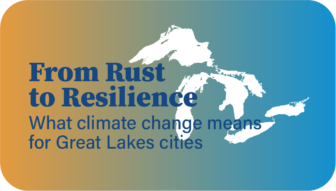A new INN-led collaborative reporting project about climate change in the Great Lakes region is launching today. Called “From Rust to Resilience: What climate changes means for Great Lakes cities,” the series includes a dozen pieces that will be published or broadcast from April 20 to May 1. The project is part of the Pulitzer Center’s nationwide Connected Coastlines reporting initiative.
Six INN members are part of the collaboration: Belt Magazine, The Conversation, Ensia, Great Lakes Now at Detroit Public Television, MinnPost and Side Effects Public Media. Other partners are WUWM Milwaukee, Indiana Public Broadcasting and The Water Main from American Public Media.
 Many Great Lakes cities were once bustling manufacturing hubs, but by the 1970s they were dubbed the “Rust Belt” because of declining industry, aging factories and population loss.
Many Great Lakes cities were once bustling manufacturing hubs, but by the 1970s they were dubbed the “Rust Belt” because of declining industry, aging factories and population loss.
The series was prompted by the perception that the Great Lakes, which make up the largest body of fresh water on earth, could become a “climate refuge,” where temperatures are relatively moderate, and water is abundant.
However, the region also is highly vulnerable to the heat waves, flooding and severe storms that are expected to increase with climate change. Aging infrastructure and sewer systems that combine stormwater with wastewater, along with shorelines vulnerable to rising water levels, make Great Lakes municipalities especially susceptible to the impact of climate change.
“From Rust to Resilience” highlights cities such as Detroit, Chicago, Cleveland, Duluth, Milwaukee and Toronto, addressing issues including: What are today’s challenges and opportunities related to climate change? How are urban areas playing the hands they’ve been dealt? How might they do so better in the future?
Among the stories:
• Belt Magazine reports on Chicago, where this spring Lake Michigan reclaimed large stretches of lakefront in the city, the result of record-high lake levels, warmer temperatures, and more frequent major storms. Erosion and flooding disproportionately affect already-marginalized communities on the city's South Side.
• Ensia examines the future of Duluth as a result of climate change. The city on Lake Superior has cycled through such industries as fur trading, logging, mining, shipping, commercial fishing and now has shifted to health care, tourism and education.
• MinnPost looks at the future of the Twin Ports of Duluth, Minnesota and Superior, Wisconsin, as shipments of coal continue to decline. While cause for celebration for environmentalists, some fear the negative effect this will have on the region’s economy.
• The Conversation examines how climate change and nutrient pollution are eroding water quality, threatening 50 years of water quality gains in the Great Lakes basin.
• Side Effects Public Media and Indiana Public Broadcasting report on the increasing erosion on the Great Lakes shoreline that’s threatening beaches, parks and other recreation areas used by city residents across the region.
You can find links to the series here.